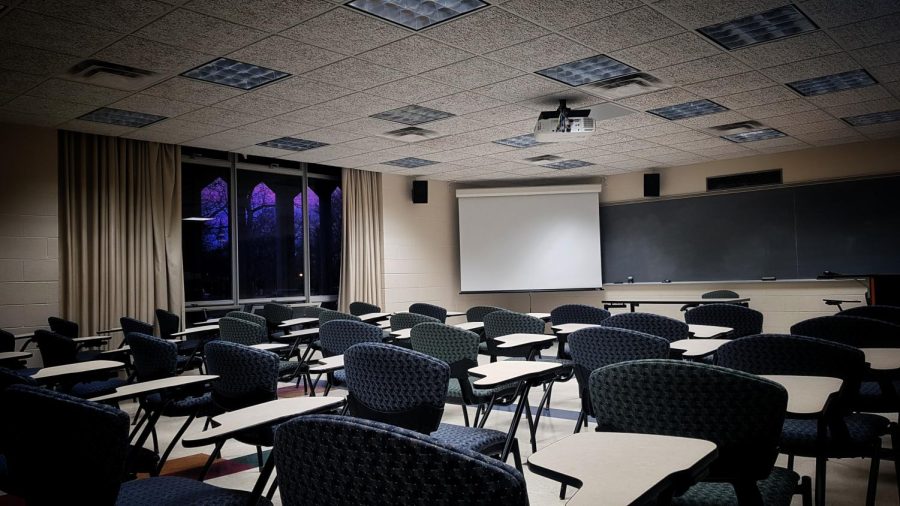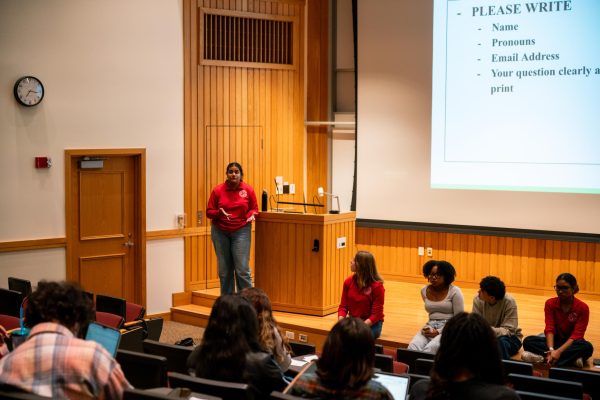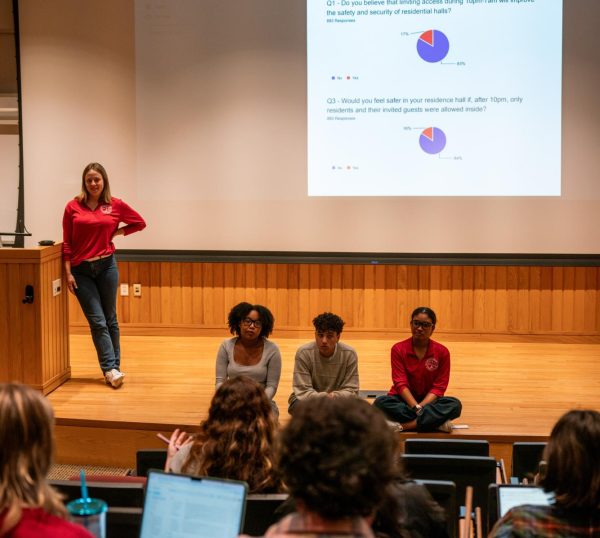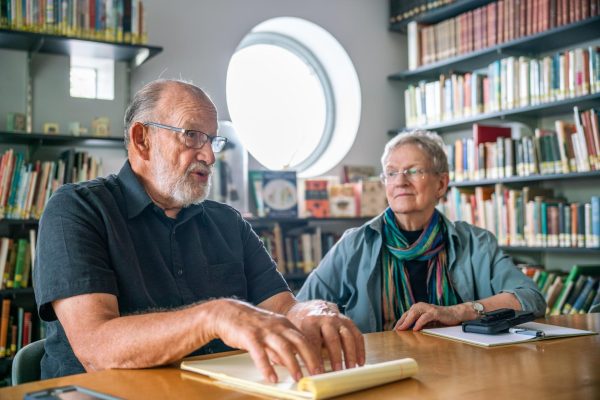Faculty Cancel Classes, Demand Fair Compensation
Some professors canceled classes this week to protest stagnant faculty compensation.
In response to the Board of Trustees’ rejection of a faculty motion to improve compensation, Oberlin’s Chapter of the American Association of University Professors recommended that faculty participate in a day of “RES(is)T(ance)” by canceling classes. Additionally, during Wednesday’s General Faculty meeting, Professor of Mathematics Jeff Witmer introduced a motion that recommended ways to make adjustments to endowment spending in order to increase faculty pay.
“This action follows other responses to the Board’s letter of rejection, such as the face-to-face meeting between members of GFC and the Board of Trustees and protests last week organized by students and faculty,” wrote Matthew Senior, chair of the Department of French and Italian in an email to the Review.
While some AAUP faculty members expressed their dissatisfaction at the situation through the day of RES(is)T(ance), Oberlin’s deans maintain that the priority should be serving students, and that canceling classes works against the institution’s collective interests.
“Throughout the pandemic, our faculty have demonstrated their extraordinary dedication to teaching and to our students,” wrote David Kamitsuka, dean of arts and sciences, in an email to the Review. “Canceling class, given its impact on students, is not the right thing to do. I’m also concerned that faculty-initiated class cancellation puts students in a very hard position if they don’t agree or feel instrumentalized. Any such cancellation should be authorized through our faculty governance committees, and with the educational best interest of our students in mind.”
Dean of the Conservatory William Quillen echoed Kamitsuka’s message, adding that teaching is the institution’s main mission.
“As a school, teaching students is our primary mission,” he said. “It’s also the personal mission of all of our faculty and staff, who have devoted their careers to this work. I both acknowledge and thank our colleagues for their extraordinary work, and I encourage and expect all of us to continue with our primary purpose of serving our students.”
In addition to some faculty expressing their dissatisfaction at the situation by cancelling classes, a majority of the General Faculty voted in solidarity with Witmer’s motion. The motion passed among the 195 people in attendance with 86 percent in favor, four percent opposed, and 10 percent abstaining. It will now go to the Board of Trustees, which is at liberty to decide the next course of action.
Witmer’s motion highlights that the payout rate from the endowment that goes toward compensation has been steadily declining. Between 2001–2015, the rate stood at 5.5 percent, but it was set at 4.4 percent for fiscal year 2022. Witmer proposes a one-time increase of the payout rate by 0.3 percent, which translates to $3 million every year toward compensation. Witmer argues that this budgetary restriction has caused faculty compensation to fall behind the rate of inflation. However, the Board does not want to tie compensation to the endowment on the grounds that change in market conditions could introduce potentially significant and adverse impacts to the actual payout amount.
Over the course of the recent General Faculty meeting, numerous professors spoke about how they were directly impacted by the shift in health care plan and the harmful nature of certain administrative decisions. According to Associate Professor of Computer Science Cynthia Taylor the prevailing tone of the meeting was tense.
“[Wednesday’s] faculty meeting made it clear that faculty are worn out, that we don’t feel supported by this institution, and that many of us are close to a breaking point,” she wrote in an email to the Review. “It also made clear just how much this has personally affected the budget and finances of many of my colleagues. In today’s meeting, President [Carmen Twillie] Ambar said she didn’t want to address personal issues in response to a faculty member volunteering just how much this was financially and medically hurting their family, but when the administration makes decisions that materially harm our lives and the welfare of our families, I don’t know how we can do anything but take it personally.”
In addition to concerns with morale, Associate Professor of Psychology and Director of the Cognitive Science Program Paul Thibodeau wrote to the Review about issues with the Board’s perceived outlook toward compensation and the tone of their March 1 letter to faculty.
“For me, the current issue has more to do with morale and trust and community than it does with compensation per se,” he wrote. “The stagnant salary and cuts to benefits have been frustrating to be sure, and my family has had to deal with headaches associated with the new health care plan. But, more than compensation, the last few years have shown me that the Board operates by a different set of values than they claim to support. … My perspective is that the Board’s letter felt condescending and out of touch. The Board made promises to faculty. They broke those promises. They don’t seem to understand how that affects their relationship with faculty moving forward. Why should we trust anything they say?”
For Professor of Classics Ben Lee, the sum of these concerns reflects not only a decline in Oberlin’s standard as an educational institution, but also a discouraging trend for the future of higher education.
“Oberlin College cannot pretend to be a beacon of education if it does not give adequate health care and benefits to its own educators,” Lee wrote in an email to the Review. “We cannot pretend to be a community that is committed to social and economic justice, when the Board and administration bully the faculty and treat them so roughly.”
Many faculty, including Senior, are particularly concerned about the disproportional impact of the new health care plan. Unlike the old Preferred Provider Organization plan, which charged a percentage of income on premiums, the high-deductible plan charges fixed premiums and the same deductible and maximum out-of-pocket costs regardless of income. Senior believes it is incumbent upon President Ambar and the Board to develop an emergency fund to support individuals who are now burdened with larger medical bills.
“Along with many of my colleagues at [Wednesday’s] GF meeting, I ask President Ambar to be our advocate to the Board, not the conduit and go-between for their inhumane and out-of-touch policies,” he wrote. “I think President Ambar might actually have considerable leverage with the Board. She is a member of the General Faculty, she is our President. She is in a position to push back against the austerity measures and financialized outlook of the Board.”
Kamitsuka assured professors and students of his continued commitment to advocate for Oberlin’s community
“As a long-standing member of our faculty, and integral to my role as Dean of the College of Arts and Sciences, I advocate on behalf of the best interest of our faculty, staff, and students in the division and the college more generally,” he wrote. “Everything I do is focused on this advocacy.”
Witmer’s motion is expected to be presented to the Board in its coming meetings, yet faculty are apprehensive about how the Board will handle the situation after their last response. In the meantime, faculty expectations on compensation and health care remain consistent with last December’s motion.
“I want them to commit to both reverting our health care plan to its previous options, and at the very least to regular cost of living raises for the faculty, if not a return to the 2013 plan to bring us to the median pay of the ‘Sweet Sixteen’ colleges,” Taylor wrote. “It’s clear that the Board would like to stall on this indefinitely by ‘investigating’ or forming committees or doing studies, and I think those responses are both inadequate and cowardly.”






